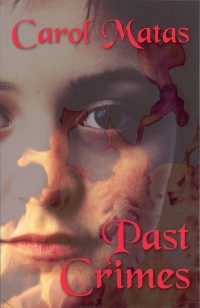| ________________
CM . . .
. Volume XIII Number 5 . . . .October 27, 2006 
 |
Past Crimes.
Carol Matas.
Toronto, ON: Key Porter Books, 2006.
188 pp., pbk., $11.95.
ISBN 1-55263-841-3
Grades 7 and up / Ages 12 and up.
Review by Ruth Latta.
*** /4
|
| |
|

excerpt:
You need to throw away all your fixed ideas. Maybe the dreams are filled with clues and have nothing to do with the Inquisition at all. Maybe the Inquisition is a symbol for you - a symbol that represents the evil around you, starting with Saul's death and leading up to this. And maybe somewhere in those dreams are names and faces that your subconscious is trying to get you to remember.
Nineteen-year-old Ros Green, the narrator/protagonist of Past Crimes, has had more than her share of trouble before this fast-paced suspenseful novel begins. Her police officer husband, Saul, was shot in an alley when their son was only two months old.
As this page-turner opens, Ros, too, has been shot and is in hospital being treated for a wound to the arm. On leaving a restaurant with friends, she heard an "incredible noise" like a car backfiring. A fatherly colleague slumped over. Almost simultaneously, her arm "felt like someone had just burned it." Something grazed her head, and everything went black.
This is just the beginning. At Ros's colleague's funeral, his ex-wife says accusingly her: "I think the bullets were for you and my husband got in the way." Next comes a threatening note, then arson, then a car bomb, then a kidnapping. Prior to and continuous with these crimes, Ros has nightmares involving accusations, betrayals, fear, smoke and fire.
Veteran novelist Carol Matas knows that a fast-paced plot is mandatory for youth raised on television. Another rule of writing is that readers identify with characters similar to, yet better than, themselves. In Ros, Matas has created a heroine who will appeal to teenage girls in general and young single mothers in particular.
Past Crimes begins a year after Ros's husband was murdered. She and her child now live in her parents' home in Palm Springs, California. Having passed through the first throes of grief, she attends university and volunteers at a women's clinic.
Although Ros is absorbed in her son and is too recently widowed to be consciously looking for another partner, the author anticipates her future needs and provides her with three eligible suitors - a police detective, a real estate developer and a fellow student. Knowing that young people don't like too much parental guidance, Matas, while sending Rosís parents on a research trip to Australia, has provided her with helpful friends in their twenties.
Yet, as the terrifying events escalate, Ros remembers discussions with her parents. These professors with inquiring minds have entertained the possibility of reincarnation. Her mother thinks that people are reborn so that they can re-experience situations that they handled badly the first time around and make them turn out better.
The supernatural pops up in most popular fiction these days, and Past Crimes is no exception. Ros decides that her nightmares are memories of a past life during the Spanish Inquisition, a topic which she is studying in her Jewish History class. Is her antagonist someone she knew in a past life?
I wondered if the character most interested in reincarnation was the guilty party and was trying to confuse Ros, but I was mistaken. The Inquisition nightmares are disturbing and leave the reader wanting to know more about this period in history, but they are not essential to discovering "who done it." One wonders if the Inquisition is an historical event of such magnitude that it ought to be the main theme of a book, not just a device to add to the plot and atmosphere.
A class discussion about hate crimes provides insights. "If you grow up insecure and afraid, you want protection," says one of Ros's fellow students. "You want to be able to see who the bad guy is. So you make the world into camps." Here, Matas conveys a powerful and timely message about the consequences of dividing people into "us" and "them." The killer's insecurities and obsessions, camouflaged for most of the novel, are revealed at the end. The green-eyed monster is, in the final analysis, a more convincing motive than a past life in 15th century Spain.
Recommended.
Ruth Latta's latest mystery (for grownups) is Illusions Die, (Ottawa, Baico Publishing Consultants, 2006).

To comment
on this title or this review, send mail to cm@umanitoba.ca.
Copyright © the Manitoba Library Association. Reproduction for personal
use is permitted only if this copyright notice is maintained. Any
other reproduction is prohibited without permission.
NEXT REVIEW |
TABLE OF CONTENTS FOR THIS ISSUE
- October 27, 2006.
AUTHORS |
TITLES |
MEDIA REVIEWS |
PROFILES |
BACK ISSUES |
SEARCH |
CMARCHIVE |
HOME |
